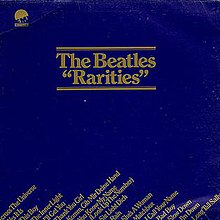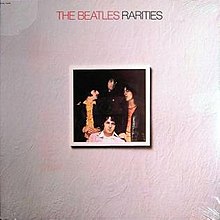1978 UK album
| Rarities | ||||
|---|---|---|---|---|
 UK cover | ||||
| Compilation album by | ||||
| Released | 2 December 1978 | |||
| Recorded | 1963–1969, EMI Studios, London; Pathé Marconi Studios, Paris; His Master's Voice studios, Bombay | |||
| Genre | Rock | |||
| Length | 43:29 | |||
| Label | Parlophone | |||
| Producer | George Martin | |||
| The Beatles British chronology | ||||
| ||||
| Review scores | |
|---|---|
| Source | Rating |
| AllMusic | |
| The Encyclopedia of Popular Music | |
Rarities is a British compilation album featuring a selection of songs by the Beatles. The album was originally released as part of The Beatles Collection , a boxed set featuring the 12 original Beatles studio albums, but was later issued individually. The album has never been issued on CD, but all of the tracks are available on the double CD compilation album Past Masters .
Rarities was conceived to include lesser-known songs that were not included on any other original Beatles album. These included B-sides of singles, two German-language recordings, the tracks from an EP with exclusive material, a song recorded for the American market and a version of "Across the Universe" that had previously appeared on a World Wildlife Fund charity record.
The selections chosen are tracks which have not appeared on any of the original British Beatles albums (that is, the albums included in The Beatles Collection). The career-spanning compilations 1962–1966 and 1967–1970 , and the Magical Mystery Tour LP (which was originally only released in the US), would all be necessary for the collector wishing to acquire every song in the entire Beatles official catalogue; however, still missing would be the original single version of "Love Me Do". This track, which went out of print in late 1963, was not available anywhere until its inclusion on the 1980 Capitol Records compilation album Rarities. In 1982, the original recording of "Love Me Do" was finally reissued in Britain on a 12" single.
Rarities was released on 2 November 1978 in the United Kingdom, as part of The Beatles Collection boxed set. Due to popular demand, the Rarities album was issued separately on 12 October 1979, in the UK.
Track listing
All songs written by Lennon–McCartney except where indicated. All songs are in mono unless indicated as stereo.
- Side one
- "Across the Universe" ("Wildlife" version from a British various artists charity album titled No One's Gonna Change Our World ) stereo
- "Yes It Is" (B-side)
- "This Boy" (B-side)
- "The Inner Light" (George Harrison) (B-side)
- "I'll Get You" (B-side)
- "Thank You Girl" (B-side)
- "Komm, Gib Mir Deine Hand" (German version of "I Want to Hold Your Hand") stereo
- "You Know My Name (Look Up the Number)" (B-side)
- "Sie Liebt Dich" (German version of "She Loves You") stereo
The unique US pressing of Rarities included in the American limited-edition numbered boxed set of The Beatles Collection contained "I Want to Hold Your Hand" rather than "Komm Gib Mir Deine Hand", and "She Loves You" rather than "Sie Liebt Dich".
- Side two
- "Rain" (B-side)
- "She's a Woman" (B-side)
- "Matchbox" (Perkins) (From Long Tall Sally EP)
- "I Call Your Name" (From Long Tall Sally EP)
- "Bad Boy" (Williams) (recorded for the American LP Beatles VI , first UK release on A Collection of Beatles Oldies ) stereo
- "Slow Down" (Williams) (From Long Tall Sally EP)
- "I'm Down" (B-side)
- "Long Tall Sally" (Johnson/Penniman/Blackwell) (From "Long Tall Sally" EP)
